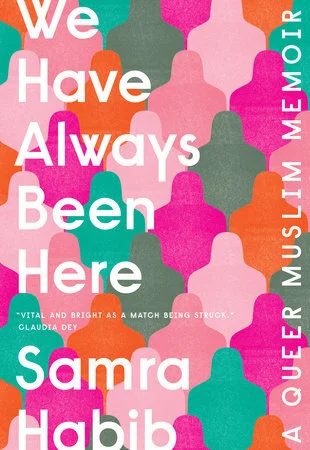We Have Always Been Here: A QUEER MUSLIM MEMIOR
Samra Habib
Viking, 2019 $24.95
Reviewed by Serenity Schoonover
In We Have Always Been Here, Samra Habib relays a perceptive account of her turbulent childhood in Pakistan, her family’s emigration to Canada as refugees, and life as a spokesperson for queer Muslims.
Growing up in Pakistan, Habib is firmly situated in the stabilizing, yet strictly controlled, world of her mother and female relatives-safety which proves to be an artifice after a neighbor sexually abuses her. This trauma made her aware that women in Pakistan were vulnerable and marginalized, with very few alternatives at their disposal. Habib writes, “I’d only ever been surrounded by women who didn’t have the blueprint for claiming their lives” (2).
Due to Islamic sectarian violence, Habib’s family flees Pakistan for Canada, and while the move brings physical security, they must now deal with culture shock and incidents of xenophobia. Shortly after, at the age of 16, Habib discovers she is expected to enter an arranged marriage with her cousin. Disturbed by this fate but without recourse, Habib complies with her parents’ wishes:
I was destined for a life of servitude, just like Nasir’s mother, my mother and my mother’s mother, who all muted their ambitions and defining traits to be pious sisters, getting lost in a sea of burka-clad wives. (62)
Throughout the narrative, the bombardment of religious and cultural expectations from Habib’s parents never lets up, and even as she describes a world where “every move was carefully inspected for any trace of sin,” it only serves to make her more determined to define her own destiny (67). Free-thinking friends provide the necessary support and leverage she needs to finally escape. She writes:
I’d been taught that women weren’t supposed to speak their minds . . . [but] as a woman in this world it’s important to take up space and make yourself heard, even if it intimidates and offends. (123)
In a period of life she characterizes as “my crash course on a life I’d missed,” Habib begins to experiment with open and queer relationships, begins a writing career at a magazine, and joins a queer-friendly mosque. She shares the inspiration behind an ongoing photojournalism project documenting the lives of queer Muslims, which she hopes will “create a platform where queer Muslims could be their authentic selves” (176).
We Have Always Been Here deftly conveys the conflicted path that exists for anyone trying to reconcile religious and cultural expectations with their sexual identity, a trajectory that for Habib, will continue to evolve.
Serenity Schoonover has an MA in History, is a fellow with the Arrowhead Regional Arts Council, and teaches writing classes to adults and teens. She was recently selected to teach at The Loft Literary Center in Minneapolis, MN. Her work has aired on National Public Radio and appeared in Women’s Independent Press, Cross-Country Skier, Bella Grace, CALYX, among others.

